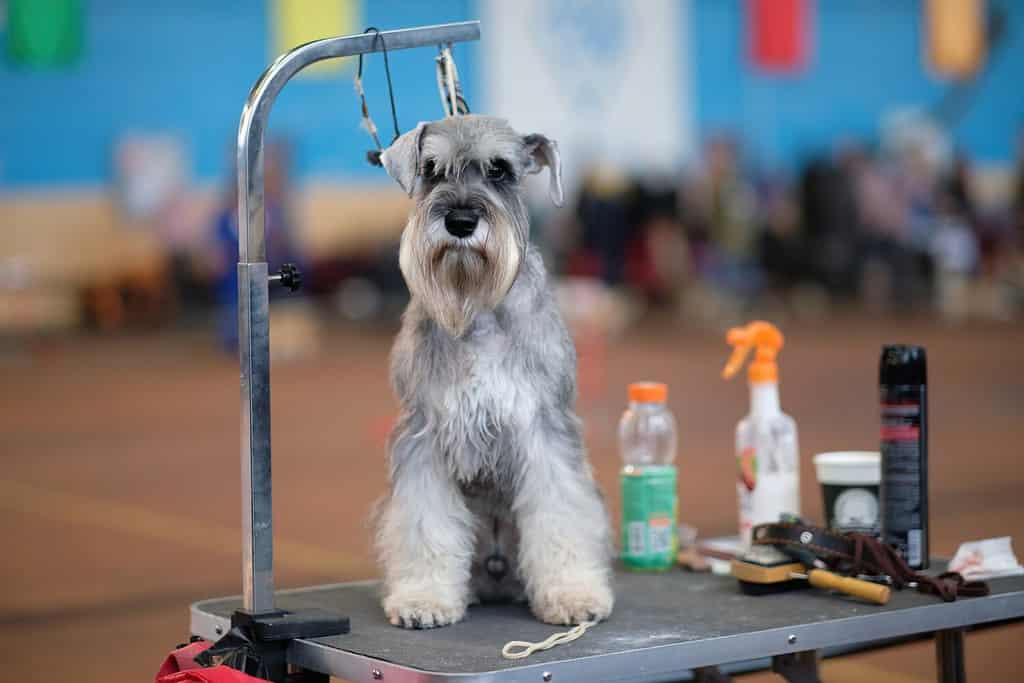The miniature schnauzer is one of the most social and bouncy pups you could ever adopt. These loving dogs are bred to be hypoallergenic, making them the ideal companion for anyone with allergies. They barely shed, but they need regular brushing to keep their coat healthy. If you decide to adopt one, prepare yourself by learning how to easily keep them healthy.
Though the lifespan of this miniature breed is well over a decade, your care makes the difference in their comfort and wellness. Let’s take a look at the lifespan of this small dog and what you can do to make the most of it.
Life Expectancy of the Miniature Schnauzer

The mini schnauzer has a lifespan similar to that of the larger dog it comes from.
©Debra Anderson/Shutterstock.com
With proper care and breeding, the average life expectancy of the miniature schnauzer is 12-15 years. If you adopt this dog as a puppy from its genetic parents, learn about its health. Knowing the previous owner’s experience with your puppy’s parents helps you understand the health issues they might experience.
Heart disease, as is life expectancy, is the biggest threat to a miniature schnauzer. Heart failure is one of the leading causes of death for this breed due to deformed heart valves that stem from birth. Neoplasia and brain disorders also plague this disease.
Due to the resilience of this breed, proper care and low stress help these dogs to live beyond their expected lifespan. Many owners report that their dogs have easily lived to be 18+ years old.
Miniature Schnauzers and Their Common Health Issues

The only way to ensure your miniature schnauzer is healthy is with regular screenings at the vet for common diseases.
©iStock.com/Wirestock
The only roadblock that you face with a miniature schnauzer is their health. For the most part, miniature schnauzers and their larger counterparts are healthy. Knowing these dogs’ diseases helps you provide them with the right care. While your dog may never face any of these challenges, having an idea of their potential diseases ahead of time prepares you better for your new family member.
Kidney Stones
Over 40% of all dogs that get kidney stones are miniature schnauzers, though males are more susceptible. They are more likely to develop them than any other breed. Some scientists theorize that the cause of their high odds is genetic issues in their urinary tract. Unfortunately, this same abnormality is also why miniature schnauzers get bladder infections frequently.
Changes in how much this dog urinates are a good indication of kidney stones. Your dog’s urine might have blood in it, and their appetite decreases. Some dogs also vomit and have trouble urinating.
Eye Disease
Even though eye disease is one of the most common health issues that your miniature schnauzer faces, it is avoidable. If you want to work with a breeder, ask for their certificate from the Canine Eye Registration Foundation. If they have this certification, the parents of your new puppy already passed tests to ensure their eye health with a veterinary ophthalmologist. There’s no guarantee that this certification means that they won’t develop eye disease, but the genetic predisposition isn’t there. Get regular screenings for progressive retinal atrophy and retinal dysplasia.
Heart Disease
Heart disease is brutal for miniature schnauzers. Getting regular checkups with a vet helps, but heart disease arises spontaneously. Grooming, brushing teeth, and maintaining a healthy diet all reduce the risk, but age puts them at a higher risk. It happens as the heart valves struggle to close as it pumps blood. Detecting these issues early gives you time to get your dog on medication with their vet.
Dental Disease
Brushing your dog’s teeth regularly eliminates the risk of dental disease. Without brushing, anything that their teeth touch contributes to plaque buildup. Instead of being removed and brushed away, the buildup eventually causes the gums to be infected. The infection reaches the roots of their teeth and spreads to the rest of the body. Regular brushing is a simple step that consumers take to protect their dog’s teeth, kidneys, and heart from bacterial infections. Some dogs also enjoy dental treats and abrasive dry dog kibble to help.
If you notice that your dog has swelling anywhere on its mouth or its breath is bad, take it to the vet. Swollen gums are the clearest sign of infection, causing the gums to bleed. Keep an eye on your dog’s chew toys and water bowl for any signs of bleeding. Dogs with gum disease might also drool more than they usually do.
Ear Infections
The excessive hair in your dog’s ears puts them at a higher risk for ear infections. When the hairs trap dirt, it irritates the ears and prevents them from aerating properly, making them a moist hotspot for bacteria and fungi to grow.
If your dog’s ears smell bad or become red, they might have an ear infection. Many dogs rub or scratch their ears when they deal with this pain. Most vets prescribe ear drops, which heal their infection fast.
Healthy Activities for Your Mini Schnauzer

To keep your dog healthy, they need plenty of time to go outside and play to keep their muscles strong and their weight under control.
©Lunja/Shutterstock.com
With a small build and incredible intelligence, miniature schnauzers thrive on activities that engage their mind and bodies. They are highly social animals, and they want to spend as much time with people as possible. If your household constantly moves and gets outside, you do enough to keep your pup’s heart happy.
They don’t like to stay home alone, so bring them along to walk during your errands and activities with family. Getting fresh air and exercise helps to keep them active. While most terriers need little activity outside of the home, miniature schnauzers should get at least an hour a day. If you have a big yard with plenty of places to explore, they keep themselves quite busy.
Engage in games that keep their brain sharp. Training this dog is a little difficult with their strong-willed personality, but the challenge of mental tests and games helps greatly. Hide treats or toys in the ground to let them dig, which relieves anxiety.
Other Ways to Improve Your Miniature Schnauzer’s Health

The best things that you can do for a miniature schnauzer are to bring it to the vet regularly, keep it groomed, and maintain its teeth.
©Ihar Halavach/Shutterstock.com
Creating a consistent and healthy routine for your miniature schnauzer takes effort. Going to the veterinarian regularly ensures that this pup is screened for possible health issues early. Find a vet who understands how to care for a miniature breed and create a consistent routine with their health care. Learn about their office hours, who to call in an emergency, and be completely honest with any answers you provide. This relationship is almost as important as your relationship with your pet.
Your miniature pup’s diet sets the tone for their overall health. Everything from the texture of their fur to the consistency of their digestive system relies on eating right. The American Miniature Schnauzer Club https://amsc.us/general-health/nutrition/ recommends choosing food with 10% to 15% fat content. These dogs have a sensitive stomach, which makes adequate water supply equally important. Make sure to offer 1 ounce of water per pound of body weight, which is 10-15 pounds.
Consistently keep your dog’s teeth brushed. Periodontal disease is a common condition among miniature schnauzers over age 3. By taking care of their teeth properly, they avoid dangerous health conditions like liver disease and diabetes. If your dog has particularly bad breath or swollen gums, get them to the vet as soon as you can. Pair dental care with consistent grooming to set the tone for the rest of their body.
When Should You Bring Your Miniature Schnauzer to the Vet?
Though pet owners do anything to make sure that their miniature schnauzer gets the care they need, emergencies happen. If you take your dog to the vet regularly, any change in their demeanor or activity is noticed easily. Still, apart from these preventative measures, there are a few situations that could arise.
Medical symptoms like bad breath, smelly ears, or itchy eyes are distinct signs that something is wrong. Considering this dog’s natural energy, any physical fatigue needs to be taken seriously. Most issues, beyond obvious injuries, are relatively easy to treat. Getting professional care ensures that they live the long and healthy lives that they are meant for.
Ready to discover the top 10 cutest dog breeds in the entire world?
How about the fastest dogs, the largest dogs and those that are -- quite frankly -- just the kindest dogs on the planet? Each day, AZ Animals sends out lists just like this to our thousands of email subscribers. And the best part? It's FREE. Join today by entering your email below.
Thank you for reading! Have some feedback for us? Contact the AZ Animals editorial team.








